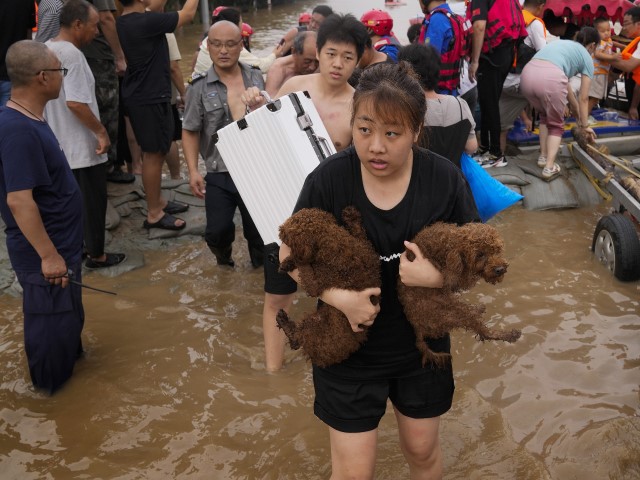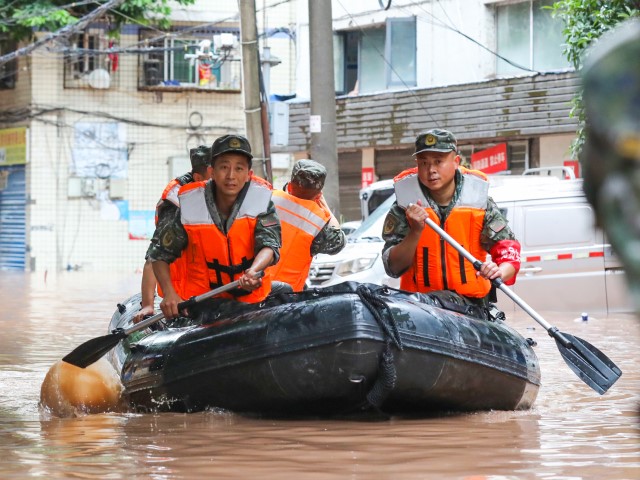Angry Chinese citizens this week defied massive government propaganda, and challenged China’s vast army of censors, to blame state policies and mismanagement for deaths from typhoon flooding.
Some critics warned that China’s habit of diverting floods into poor farming communities to protect Beijing, and the pet projects of the ruling elite, could cause a major food crisis in the coming year.
Japan’s NHK News spotted an unusually large number of Chinese social media posts blaming “outdated drainage facilities” for deaths from road flooding in Beijing.
Some flood victims actually held rare street protests in Hebei province last Friday, “upset by state media reports and authorities’ inadequate response to the disaster.”
Hebei is the province that was ordered to “resolutely play a good role of moat for the capital” by an arrogant Chinese Communist Party official last week, setting off a social media firestorm.
The official, Ni Yuefeng, added that protecting Xiongan – dictator Xi Jinping’s pet project of a model futuristic city – was the “top priority of flood control” in Hebei, even as entire villages were wiped out by flooding and dozens were killed.

A woman carries her pet dogs as residents are evacuated on rubber boats through floodwaters in Zhuozhou in northern China’s Hebei province, south of Beijing, Wednesday, Aug. 2, 2023. (Andy Wong/AP)
Bloomberg News noted on Wednesday that the full number of deaths from flooding is clearly being covered up by the Chinese government, as casualty reports abruptly ceased four days ago and no fatality numbers have been provided from Zhuozhou, the Hebei city hit by the heaviest flooding.
“The government tried to protect a community in Beijing, so they sacrificed the city of Zhuozhou,” said David Zhang, a photographer covering the devastation in Hebei province.
“The overwhelming frustration is towards the local government and Beijing. The flood was caused by the government’s attempt to save communities in Beijing and Xiongan because of their higher status,” Zhang told the Sydney Morning Herald (SMH) on Tuesday.
Zhang said “political” and “economic considerations” were clearly more important to Communist leaders than the lives and livelihoods of rural residents.
“In the early days of the floods, the official propaganda only focused on how the devastation has been affecting people. But there were no rescue efforts from officials to come into town and save people,” he noted.

Armed police use a rubber boat to transfer trapped villagers on July 4, 2023, in Chongqing, China. Wanzhou district in Chongqing issued a red rain warning on the morning of July 4 after experiencing several days of heavy rainfalls. (Zou Yi/VCG via Getty Images)
The SMH said a scandal is brewing in Hebei’s neighboring province of Henan over “reports that funds earmarked for recovery have been siphoned off by local officials.” A similar scandal over misspent emergency funds followed heavy floods that killed over 400 people in Henan in 2021.
News reports on the scandal have been completely scrubbed from social media by Communist censors, as have documented appeals from the now-devastated city of Zhuozhou for more emergency resources when the floods began.
NHK suggested public ire was further inflamed by Chinese Communist leaders making a big show of giving themselves awards for their outstanding flood management skills, less than two weeks before heavy rains began wiping out rural communities:
State-run China Central Television reported on Saturday about a pregnant woman thanking rescue workers. She had been isolated in her home in the northern Chinese province of Hebei due to flooding.
The network reported on Sunday that Vice Premier Zhang Guoqing visited Tianjin, near Beijing, and observed workers taking flood-prevention measures and armed police delivering supplies to isolated areas.
People’s Daily, a Communist Party organ, published on July 19 an article about an upcoming book that praises President Xi Jinping’s achievements in flood control projects.
The Chinese Communist Party might have saved its favorite showcase districts and industrial assets at the cost of next year’s harvest. The region known as the “northern granary” was badly flooded and is now infected by pests. The SMH counted 50,000 hectares of crops that have been utterly destroyed, and another 90,000 hectares with severe damage, putting almost a fifth of China’s grain production at risk along with vital corn, rice, and soybean fields.
“I’ve worked as a farmer all my life, and this is not the first time I’ve had damage from floods, but the damage this year is the worst,” one farmer told NBC News on Tuesday, estimating that only a fifth of his corn would survive until the harvest.
“The corn we grew in spring will have little or zero harvest this year, depending on if we have any rain in the upcoming two weeks,” said another.
The South China Morning Post (SCMP) on Tuesday described farmers posting frantic pleas for help on social media:
In two days, videos uploaded by farmers asking for assistance went viral on Chinese social media, as they feared that all of the silt that has accumulated on blossoming rice crops could reduce yields.
“We want to use a high-pressure water gun to flush the silt off, but this is too much work, and we desperately need help from real experts from all fields,” a Heilongjiang woman said in one of the videos.
Hubei University plant genetics professor Huang Bangquan held out hope that while rice yields “will definitely be reduced,” the crop might survive heavy silt contamination from the floods – but then pests and plant diseases will begin taking their toll.


